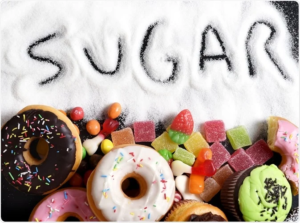Sugar As An Addictive Drug and Fat Promoter
 Dr. Michael Wald, aka The Blood Detective, is the director of nutritional services at Integrated Medicine of Mount Kisco, located in Westchester New York. He has appeared on ABC World News Tonight with Diane Sawyer, Channel 11 PIX, Channel 12 News, CNN, The Food Network and other media outlets. Dr. Wald earned the name Blood Detective for his reputation to find problems that are often missed by other doctors. He earned an MD degree, is a doctor of chiropractic and a certified dietician-nutritionist. He is also double-board certified in nutrition. He has published over a dozen books with three additional titles due for release late 2013 including: Frankenfoods – Genetically Modified Foods: Controversies, Lies & Your Health and Gluten-A-Holic: How to Live Gluten Free and the Blood Detective’s Longevity Secrets
Dr. Michael Wald, aka The Blood Detective, is the director of nutritional services at Integrated Medicine of Mount Kisco, located in Westchester New York. He has appeared on ABC World News Tonight with Diane Sawyer, Channel 11 PIX, Channel 12 News, CNN, The Food Network and other media outlets. Dr. Wald earned the name Blood Detective for his reputation to find problems that are often missed by other doctors. He earned an MD degree, is a doctor of chiropractic and a certified dietician-nutritionist. He is also double-board certified in nutrition. He has published over a dozen books with three additional titles due for release late 2013 including: Frankenfoods – Genetically Modified Foods: Controversies, Lies & Your Health and Gluten-A-Holic: How to Live Gluten Free and the Blood Detective’s Longevity Secrets
- Sugar and brain addiction response: Overall, this research has revealed that sugar and sweet reward can not only substitute to addictive drugs, like cocaine, but can even be more rewarding and attractive. At the neurobiological level, the neural substrates of sugar and sweet reward appear to be more robust than those of cocaine (i.e., more resistant to functional failures), possibly reflecting past selective evolutionary pressures for seeking and taking foods high in sugar and calories. The biological robustness in the neural substrates of sugar and sweet reward may be sufficient to explain why many people can have difficultly to control the consumption of foods high in sugar when continuously exposed to them.
- Sugar is the main energy source for the brain. When you eat sugar it almost immediately crosses the blood-brain barrier and says to the brain, “feed me”. A diet high in sugar or a diet of moderate but frequent sugar consumption teaches the brain to want to eat more often.
- Sugar and increase in hunger by increasing insulin which causes a drop in blood sugar.
- Sugar is high on the glycemic index. Sugar causes a rapid rise and a rapid drop in blood sugar by increasing insulin levels and the production of a protein called C-peptide from the pancreas. This drop in blood sugar tells the brain to increase caloric consumption.
- Sugar increases insulin whereby reducing blood sugar stimulating the feeding center in the hypothalamus to want to increase caloric intake
- Sugar causes a decrease in brain and intestinal serotonin levels which can increase appetite and also cause a “dull mood”, depression and create a chemical dependence (addictive response) or sugar.
- Sugar decreases glucagon levels and glucagon-like peptide-1 (GLP-1), hormones involved in satiety, increasing appetite. On the other hand, dietary protein increases glucagon and glucagon-like peptide-1 (GLP-1) decreasing appetite.
- The endocannabinoid system is involved in the regulation of energy balance and metabolism. Endocannabinoids have central effects with raising appetite and hunger. On the other hand, different components of the endocannabinoid system are also found in peripheral organs and tissues and they could impact the lipid and glucose metabolism. Obesity is associated with an overactivity of the endocannabinoid system with increased both plasmatic and visceral adipose tissue levels. The amount of the intra-abdominal fat mass is an indicator of the peripheral endocannabinoid system dysregulation.
Nutritional Supplements containing natural compounds studied to potentially help sugar regulation:
- Blood Sugar Balance – comprehensive combination working synergistically.
- Magnesium Chelate – to promote best magnesium absorption.
- Multivitamin-Mineral – providing many of the basic nutrition fundamentals.
- Fiber Insoluble-Soluble – important to help balance blood sugar
- Whey Protein – New Zealand Herd
- Also, space meals out every few hours and “graze” rather than eat large meals
- Regular exercise, adequate sleep, considers a low glycemic diet.
(All nutrients found at Blooddetective.com plus additional videos and articles. All nutritional supplement products should be taken along with a blood sugar balanced diet)
References:
1. Lean M E, et al. Weight loss with high and low carbohydrate 1200 kcal diets in free living women. Eur J Clin Nutr 1997;51:243-248
2. Wien M A, et al. Almonds vs complex carbohydrates in a weight reduction program. Int J Obes 2003;27:1365-1372
3. Young CM, et al. Effect of body composition and other parameters in obese young men of carbohydrate level of reduction diet. Am J Clin Nutr 1971;24:290-6
4. Roberts SB. High-glycemic index foods, hunger, and obesity: is there a connection? Nutrition Review 2000 58:163-169
5. A high-glycemic meal pattern elicited increased subjective appetite sensations in overweight and obese women. Arumugam V, et al. Appetite;2007 25 July [Epub ahead of print].